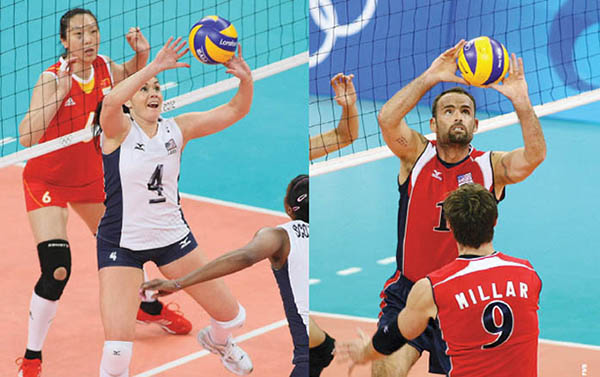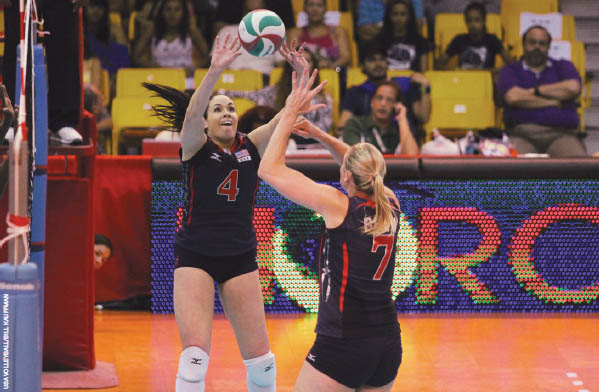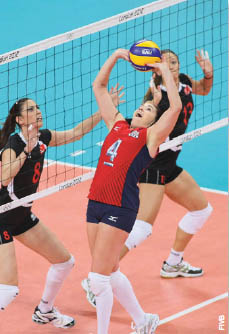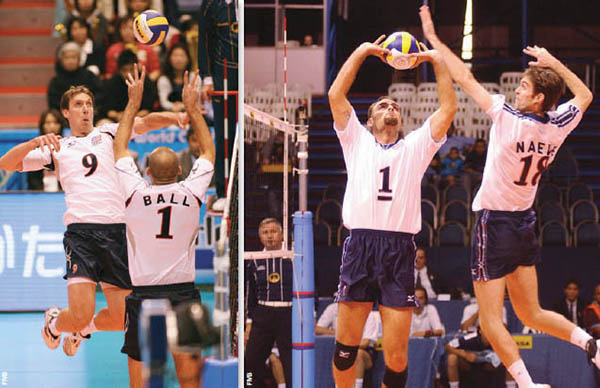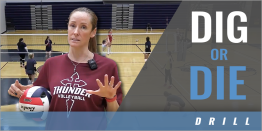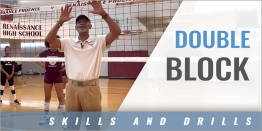|
By: Lindsey Berg and Lloy Ball Originally Published in: Coaching Volleyball Magazine Provided By: AVCA
At the 2012 AVCA Annual Convention in Louisville, KY, the Pre-Convention Seminar was titled "Developing a Great Setter: Drills and Techniques from the Youth to the College Level." The distinguished panel included Arnie Ball (Fort Wayne, Ind.), AVCA Hall of Fame inductee and long-time collegiate men's volleyball coach; Cathy Noth (Madison, Wis.), former U.S. Women's National Team setter; Jim Miret (Englewood, Colo.), Front Range Volleyball Club; Lloy Ball (Fort Wayne, Ind.), four-time Olympian and 2008 gold medal setter with Team USA; and Lindsey Berg (Honolulu, Hawaii), three-time Olympian (two silver medals) as the setter with Team USA. During this special in-depth session, the panel explored the art of both developing and then coaching a great setter. The distinguished group dissected all of the areas most critical to setter success: technique, strategy, tactics, leadership and team management. One of the most fascinating elements of the pre-convention seminar was the discussion of the relationship between the setter and the coach, addressed in-depth by Ball and Berg. Following are their observations regarding their interactions with the myriad coaches they have worked with over the years, offering suggestions regarding what you as a coach can do, not only to develop your setter, but also to foster a strong relationship.
Please keep in mind these are all going to be my personal experiences, and I understand everyone is different, every coaching experience is different and every relationship with a player is different. Fortunately, I have had some incredible relationships with my coaches. In fact, I look at those relationships more as partnerships because my coaches respected me and I could talk as a true partner. Let's begin at the beginning. Other than my father (Dennis Berg), Charlie Wade and Dave Shoji were the two coaches who taught me to play volleyball. I was the one who was always playing up — the 14-yearold playing with the 16s. At the time, these two coaches were so hard on me — and I didn't understand why. Obviously, they knew how important the setting position was. As a result, they made me mentally tough and taught me to overcome those situations where your coach is tough on you. As the setter, you are going to get the brunt of many uncomfortable situations because you run the team. To be honest, throughout my club experience, I hated Charlie and Dave. Let me explain. I loved them because they were close family friends; yet, I was forever asking, "Can't you just get off my back for a second?" Now I thank them because they fostered my mental toughness, my drive and my desire to be better than what everyone expected me to be. Charlie and Dave got me to the point where a top collegiate coach like Mike Hebert (University of Minnesota) recruited me.
The next phase of my volleyball career was under the tutelage of Mike Hebert at Minnesota (1998-2001). Our initial relationship started through trust. The college years are a huge learning experience. It is where you really develop as a setter. In fact, when I went to college, my experience involved taking what I learned of the mental toughness and then working hard and touching a lot of balls. Mike gave me the confidence to learn and get better. In fact, he brought me to Minnesota to run the team, and he showed that because he would leave me in the game, no matter what. He had the confidence and trust that I would pull through, was going to get better and was going to learn through adverse situations. As a result, I would then help build the program and lead the team. Of course, Mike and I weren't "best friends," but we had a good relationship and talked. It was a coach talking to a player, but he took the time to get to know me personally. He knew who Lindsey Berg was and I think that is very important. A coach needs to know what really drives the setter: why does she want to be out there on the court — and more importantly, what makes her not want to be there? Getting to know someone's story really can help you to coach her better. My relationship with Mike eventually gave me the confidence to play professionally in the U.S. (Berg led the Minnesota Chill to the United States Professional Volleyball League (USPVL) championship in 2002 while earning Outstanding Server, Outstanding Setter and All-USPV honors.) By January 2003, I was ready to try out for the U.S. Women's National Team. At that time, Toshi Yoshida was the USA women's coach. Going from Hebert, who was extremely personable and a confidence builder to a coach who didn't seem to have a personal relationship with his players was really difficult. Of course, it was also really challenging to beat out every other setter who was in front of me! Practice lasted eight to nine hours a day and was something I had never experienced in my life. In fact, I packed my bags multiple times! The main reason why it was so difficult with the national team was because I didn't know if Toshi ever trusted me. Don't get me wrong; Toshi is an incredible coach for different reasons, and I learned a tremendous amount from him. But for me, as a setter trying to run a team, that type of relationship was really difficult for me. I never knew if he trusted me because there wasn't much discussion going on between the two of us other than during video sessions. As a result, I don't think I played my best and I don't think he got the most out of me because of his coaching style. (Yoshida led the women's team to a bronze medal at the 2003 World Cup and a fifth-place finish at the 2004 Olympic Games in Athens.)
After the 2004 Olympics, I went to Italy to play professionally for coach Marcello Abbondanza and the team Scavolini Pesaro in 2005. In fact, Marcello observed me playing with the U.S. national team and asked me to come to Italy. At that point, I knew he respected and trusted me. I had never played professionally on an international stage, but Marcello and I built a strong relationship and eventually a partnership. I would view video five times a day with him and I learned so much. He reads a team so well and could tell me exactly what to do in any given situation. He coached me for five years in Italy and we were tactical partners. He would ask me what I thought we should do, and then he told me what he thought and why. We worked together tactically because he already had the respect for me and knew I worked hard and just wanted to win. It truly became a friendship. It was an incredible experience because I learned so much about how to break down another team, how to dissect what I was doing, and it was all because of our powerful communication. I had other coaches in between, including lenny" Lang Ping (who coached Team USA to a silver medal at the 2008 Beijing Olympics). I actually had a great relationship with Jenny. I knew her before she came to be our coach and we had multiple conversations. Jenny was one of the best players in the world when she played. Sometimes she would say, "You just have to do this," and some of the other players were unsure how to execute. Most of us had been used to having a male coach at very high levels and the woman-to-woman competition was often difficult. I personally had a great experience with Jenny because she knew what I could do in terms of setting and she got to know what drove me and knew how to make me better. Then I moved on to Hugh McCutcheon, my most recent coach (who led Team USA to the silver medal at the 2012 Olympics in London). Like Marcello, Hugh had seen everything I had done and had the respect, confidence and trust that I could lead the team. We started out in a partnership to do whatever we could to make this team better and win a gold medal. Indeed, when a player gets to that level, there isn't a lot of coaching; it is actually more tactical, and success comes as a result of teamwork and communication. In general, I work best when there is open, sincere, honest communication be-tween the setter and the coach. I know it is not going to be like that at lower levels; however, it is incredible how you can make a team work and how much better you can make everyone around you when those things are present.
I like to equate my volleyball career to my tenure at university, when you have several professors teaching different subjects and life lessons. Hopefully, by the end of your collegiate career, you have put together your own philosophy of life as a result of integrating bits and pieces from the men and women who have taught you and ultimately have experienced things you haven't. I think it is the same with coaches. Like Lindsey, there were some coaches I didn't care for and some I did. I do have to say playing for my dad (AVCA Hall of Fame coach Arnie Ball, who has led the IPFW men's team for 32 years) put every other coach after that at a great disadvantage. He is the best coach I ever had (1991- 95). He is the one who technically taught me all my skills, and instilled in me the passion for the game I still have at 40. He is the one who pushes me every day to be the best I can. Eventually, I had to stop comparing other coaches to him because they would always fall short. I think I was really lucky to get started off on the right foot being coached by a great man. With USA volleyball, I have had some legends of the game coach me, starting with Bill Neville at the ripe age of 17, to Doug Beal, who obviously is world-renowned for his impact on the game and being a gold medal coach, to Fred Sturm and Rod Wilde, back to Beal, and then to Hugh McCutcheon at the end of my career Being someone who probably played too passionately at times and didn't use his head enough until late in my career, I butted heads with almost all of them. Being one of those players who always thought I was right and I knew best, it took me awhile to calm down, listen, appreciate and absorb the information before making any rash decisions or comments. Basically, it took me until the age of 32 to actually figure out the setter position. The biggest reason is that in the men's game, the players develop much later because of the lack of opportunities at younger ages. If you look at the average age of the U.S. men's team, it has been 30+ for the last three Olympics. Half our guys didn't start playing volleyball until they were 17. It takes a considerable amount of time to master a position like setter when you start so late. Coming out of college and playing in the 1996 Olympics, I was not a great setter. Luckily, I think playing overseas for 16 years had even more of an impact on my setting. My first three years were in Japan and there was one foreigner allowed per team. Besides the fact that we had to run home with weight vests after practice every day, we practiced eight hours a day, climbed ropes and did body squats with other Japanese players on our shoulders. Going to Japan changed my skill level in setting because I got a ton of reps with a number of Japanese hitters who were not very good. They were all about 6-2 or 6-3, and if the ball was not in a 3x3 window, they could not get a kill. My location in those three years went through the roof and it was perfect because I just kept setting. Talk about practice makes perfect! Then, going to Italy to play for Casa Modena Salumi (2000-04) is where I learned how to win volleyball games. The coach really put together great game plans and worked with me one-on-one before, during and after practice. I knew exactly what to do and when to do it at each given moment. Then I went to Greece and played professionally for two years with Iraklis (2004-06). We went 46-0. In Greece I learned whether it is for a paycheck or for your country, you have to win. It doesn't matter if you are hurt, it doesn't matter how you do it, those coaches taught me how to win. For the last six years working with coach Vladimir Alekno from the Russian National Team, he just let me be me, like Hugh did. We would prepare and prepare, but in the end, every time out he didn't say anything to me. At the time, my experience took over and he trusted me to get the job done and I knew I never wanted to let him down. Alekno played and coached outside of Russia for several years in Italy and France, and brought a new mentality to the Russian men's team, as well as my professional team, Dynamo. I took all that, brought it back to Hugh, who dialed in to what Lloy Ball had to do to make his team win. For me, it was career- changing at this point with the national team. For 10 years I was captain and starting setter. Being the setter entails a lot of preparation — more video than most, more stats, more reps because you have to deal with all different kinds of hitters, balls and situations. Then you also have before- and after-game interviews, what color shirt we are wearing, etc. By the end you are mentally spent. Luckily for us in 2008, Hugh saw that was limiting my abilities as a starting setter, and he did the greatest thing any coach has ever done for me: he took my captainship away and said, lust set our team." The result spoke for itself. (Team USA won the gold medal at the 2008 Beijing Games.) The coalescence of all those coaches and all those countries finally developed me into the complete player that for the last five or six years of my career made me the best in the world.
|



